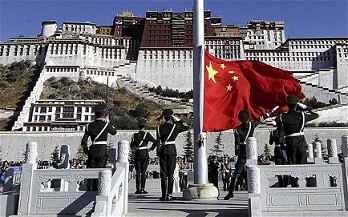Political standards will become a significant consideration in the vetting process for the recruitment of cadres in Tibet, as the Ministry of Human Resource and Social Security introduced six possible violations that can lead to disqualification.
According to the ministry's report, such violation include the making of speeches against the spirit of or overly agreeing but covertly opposing the decisions made by the Central Committee of the CPC, provoking ethnic dissension or undermining ethnic unity, and participating in or supporting ethnic separatist activities.
There is also a violation for going abroad to enshrine the Dalai Lama or sending relatives and children to schools linked to the Dalai Lama.
In a report by the Global Times, Wang Chunhuan, deputy director of the Theoretical Marxism Institute of the Tibet Autonomous Region Academy of Social Sciences (TARASS), stated that these criteria are seldom publicized.
"The notice shows that authorities in Tibet have reinforced their attitude against separatism, and have made this known publicly," said Wang.
"Ethnic separatists have recently expanded their influence to the grassroots level. Enhancing the cadres' awareness in fighting separatism would make them more effective," Wang added.
The guidelines seek to ensure that all personnel will be loyal to the CPC, the country and the people.
"Authorities have attached more importance to maintaining ethnic unity in Tibet since 1965, and cadres in Tibet play an important role in implementing the central government's ethnic policy," stated Guo Kefan, deputy director of the Contemporary Tibetan Research Institute at TARASS.
Furthermore, the report states that 80,000 cadres were sent to various villages, 7,000 were assigned to temples and 8,000 policemen were assigned to different districts in Tibet.


